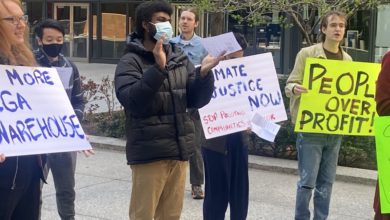Editor’s Note: This article was originally published on Jan. 9. It was updated Jan. 12 following receipt of an email from GardaWorld asserting the company was not involved in interstate transportation of migrants nor the transportation of migrants into Chicago.
Since the passing of 5-year-old Jean Carlos Martinez, a resident at a Chicago migrant shelter in the Pilsen neighborhood, the quality of health care practices of this facility and others around the city have come under scrutiny.
Although the autopsy investigation is pending, the young boy suffered vomiting, stomach pains and leg pains in the hours that led up to his death. Other children were reported to have suffered high fevers and vomiting, which is thought to have been due to unsanitary living conditions.
The shelter in which this tragedy occurred was originally intended to house about 1,000 people. However, it is currently housing between 2,500 and 3,000 individuals, with new arrivals every day. Minors make up half of the population.
Between August 2022 and November 2023, more than 21,000 migrants were transported to the Chicago area. According to the Chicago Sun-Times, individuals seeking work permits have to wait 150 days after filing for asylum to apply for them, and authorization cannot be granted until applications have been pending for 30 days. Illinois Attorney General Kwame Raoul and other attorneys general have written letters to the Department of Homeland Security to expedite permits for qualified new individuals.
Liberation News spoke to a resident of the Pilsen shelter. According to this individual, medical treatment is not an ongoing or routine service offered by the shelter. Screenings are part of a hierarchical system where those who have been in the shelter the longest are given preferential treatment. According to the resident, only once symptoms are visible and dire will the staff proceed with any medical intervention.
The facility was partnered with Lawndale Christian Health Center, whose volunteers screened about 30 individuals per day. However, the longevity of this collaboration is unclear.
Staff oversee any donations coming into the facility, and items such as food, drinks (other than water) and medical supplies are prohibited. Individuals are not allowed to enter the facility with any prohibited items. Residents have expressed fear of sharing the conditions of the shelter with any media representatives for fear of being reprimanded or kicked out of the shelter.
The state of Illinois approved a $160 million budget to address the influx of migrants. The breakdown of the spending follows as such:
- $30 million was expected to fund large intake and welcome centers for new arrivals.
- $65 million in funding was set aside to build weatherized base camps to house migrants throughout the winter or a maximum of 6 months.
- The remaining $65 million was to be used toward expanding “wraparound services” the state already offers at the city’s migrant shelters to help them with legal services, work permit applications, and other support services while securing more permanent roots.
To build the weatherized base camps and maintain them, the City of Chicago signed a $29 million contract with GardaWorld Federal Services, a security services organization. However, while the city is not moving forward with the plan for weatherized tent shelters for migrants, the contract with GardaWorld remains.
GardaWorld was one of three companies selected by the Florida Gov. Ron DeSantis to relocate migrants from Florida to other parts of the country, according to the Tampa Bay Times. In a press release sent to Liberation News, the company asserts its “contract with the Florida Division of Emergency Management remains inactivated, and GWFS was in no way involved with transportation of vulnerable populations in the state.”
The security company has been found to be negligent while overseeing migrant children in El Paso, Texas, according to Block Club Chicago. Investigations found living conditions to be unacceptable. There are reports of sexual abuse and rape of minors, outbreaks of lice and a lack of clean clothes and linens for individuals. It has also been reported that staff at GardaWorld-run centers are undertrained and ill-prepared, allowing children to suffer panic attacks without treatment for long periods of time. In a statement to Block Club, the company said it was not responsible for “case management” at the El Paso facility.
Unused federal funding originally intended for COVID relief was shifted to address the migrant crisis. In 2023, $135 million was spent for new arrivals coming into the city, with $1 million per month being spent on one warehouse’s maintenance.
Chicago Budget Director Annette Guzman notes that the city has $400 million left in federal Rescue Act funds reserved for community projects. However, she doesn’t anticipate them going towards the migrant crisis in 2024. Despite the millions spent over the past year, migrants remain in deleterious conditions and existing homeless populations remain without shelter, work or medical treatment.
The current crisis is not caused by migrants or by existing homeless populations. The crisis is fueled by imperialist sanctions against Venezuela and Cuba, forcing migration to the United States, and it is deepened by a racist, capitalist system within the United States that treats migrants as political pawns.
It is fully within the city’s power to take control of vacant office space and housing. After the pandemic, vacancy in downtown office spaces reached a record high of 23.7% at the end of November 2023, with 1.5 million square feet of new office space under construction.
This money could instead be used for refurbishing or repurposing vacant properties across the city to provide temporary housing for migrants. This temporary housing could then become permanent housing for homeless residents of the city. The city, state, and federal governments must act to provide housing and jobs for all — migrants and long-time Chicagoans.
Feature photo: A memorial for Jean Carlos Martinez located outside the Pilsen migrant shelter where he fell ill before dying. Liberation photo





